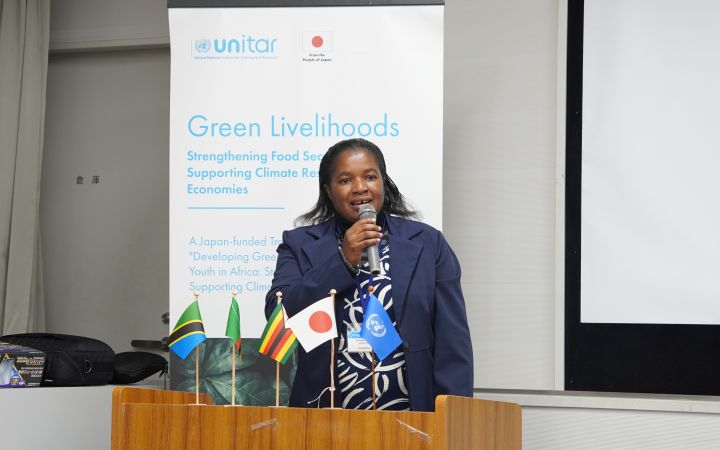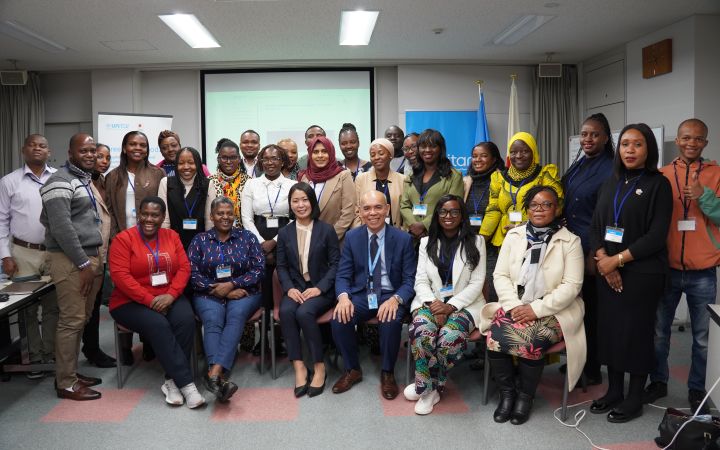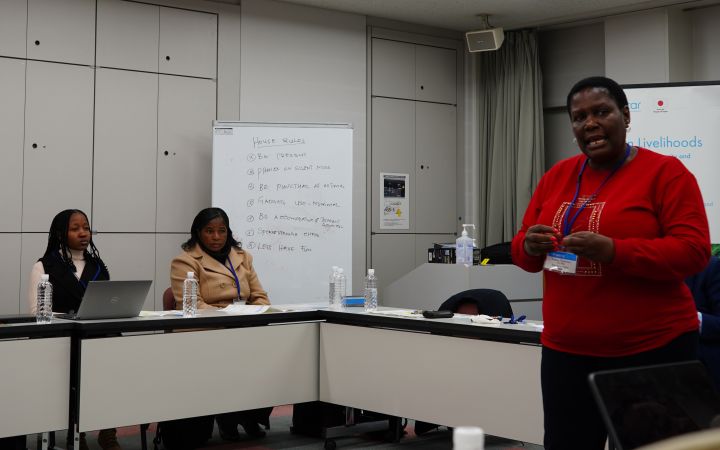- Dr. Josephine Jere is a Zimbabwean plant pathologist and lecturer whose current research bridges between waste management and agriculture.
- Dr. Jere participated in the programme “Developing Green Livelihoods for Women and Youth in Africa: Strengthening Food Security, Supporting Climate-Resilient Economies.”
- Dr. Jere was invited to join the study tour and workshop in Japan as part of the cohort. She benefited from the UNITAR training which mainly focused on the development of a business plan.
19 August 2024, Hiroshima, Japan – For most people, organic waste is a problem to be managed. However, to plant pathologist Dr. Josephine Jere, it is a resource.
Waste is not waste; waste is useful. If we can make use of waste, we can actually make a change.” —Dr. Josephine Jere, university lecturer in biological sciences and ecology at the University of Zimbabwe and UNITAR alumna
Josephine believes managing organic waste in urban areas can provide a sustainable means to revive degraded agricultural land, particularly in areas where traditional farming methods have led to soil infertility.
Developing the project through the UNITAR programme
The spark for Josephine’s idea came from Mbare Musika, the largest agricultural market in Harare. The market generates a substantial amount of organic waste, which, if not properly managed, poses health and environmental risks. Josephine’s solution is to convert this organic waste into compost, which can then be used as organic fertilizer.
Josephine, who is a university lecturer, developed her idea in the UNITAR programme “Developing Green Livelihoods for Women and Youth in Africa: Strengthening Food Security, Supporting Climate-Resilient Economies” aimed to build the entrepreneurial and digital skills of women and youth in Tanzania, Zambia and Zimbabwe, so they can develop climate-resilient businesses and create inclusive, environmentally responsible and viable employment and livelihood opportunities that contribute to climate mitigation.
The training led her through the steps to refine her idea and develop a detailed business plan.
When we embarked on this UNITAR training, we were asked to develop a business proposal. I looked at different problems we are facing, and the accumulation of waste in trading areas was a major one. Additionally, in rural areas, much of the arable land is degraded to the extent that it is no longer usable for agriculture.” —Dr. Josephine Jere
She was selected as one of the 24 top participants to join the study tour and workshop in Japan. In Japan, Josephine was particularly struck by the journey and success stories of the Satake Group, one of Japan’s biggest companies in the agriculture industry. Also, Josephine found that the programme equipped her with valuable skills in developing a business plan and the importance of sharing ideas. Following the steps she learned in the UNITAR training, Josephine and her students have begun working on prototypes for her project to use science to convert organic waste into high-quality fertilizer.
Connecting research to the market
Since her university encourages its researchers and lecturers to pursue the practical application and commercialization of their research outputs, Josephine believes she has the opportunity to set up a company that leverages both local resources and the university’s support to bring these innovations to the market.
There are still many challenges ahead. Securing financing through bank funding can be difficult since it is hard to guarantee a return on investment. Nonetheless, Josephine remains optimistic about the potential long-term impacts of her project. She is positive that if the project is successful, it could help rejuvenate some of the lost arable land, making it usable for farming again, even if it takes time.
Josephine's project exemplifies how innovation and practical solutions can address multiple community issues. By transforming waste into a valuable resource, the UNITAR alumna will not only improve urban waste management but also enhance agricultural productivity in rural areas, paving the way for a more sustainable future in Zimbabwe.
United Nations Online Volunteer John Matewe contributed to this article.
ABOUT UNITAR
The United Nations Institute for Training and Research (UNITAR) is a dedicated training arm of the United Nations. In 2022, UNITAR trained over 395,000 learners around the world to support their actions for a better future. UNITAR has a global presence, with offices in Geneva, Hiroshima, New York and Bonn and networks around the world.
UNITAR Division for Prosperity offers world-class learning and knowledge-sharing services to present and future change-makers from around the world. Through our innovative training and learning opportunities – built on robust adult learning principles – we seek to promote sustainable, inclusive and just economic development and catalyse the creation of decent employment opportunities for all.
UNITAR Division for Prosperity supports youth and women in particular to address growing inequalities. We work in solidarity with diverse partners at the local, regional and global levels to propel the 2030 Agenda and Sustainable Development Goals and achieve an inclusive, sustainable and prosperous world.




